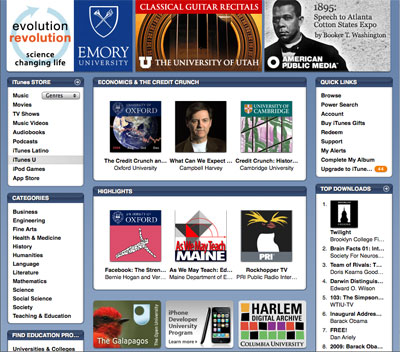
This week's podcast in the As We May Teach… series is now online:
Synthesizing Information: Google Docs and Mashups
In this podcast, I outline how to use the Google Docs spreadsheet module to create mashups, and what the advantages of this approach are for data integration and visualization.
The resources for this podcast are listed below; all feedback on these resources and the podcast is welcome.
Synthesizing Information: Google Docs and Mashups |
Mashup Resources |
|
Data and Image Sources |
My podcast series, As We May Teach, is currently featured in the "Highlights" section on iTunes U, together with the University of Oxford's Internet Institute and PRI/BBC/RockhopperTV's Survival:

Needless to say, I'm really happy about this — it's an honor to have my work featured in this company.
The next podcast in the As We May Teach… series is now online:
Networked Collaboration 101: Exploring Google Docs
This podcast takes a first look at Google Docs as a platform for collaboration, showing how it can be used for both discussion and the creation of projects that can be shared via the Web.
Resources for this podcast are listed below; suggestions for other associated resources, as well as comments on the podcast are always welcome.
Networked Collaboration 101: Exploring Google Docs |
|
A new podcast in the As We May Teach… series is now online:
Three Easy Pieces: Putting Google Earth to Work
This podcast continues the exploration of Google Earth begun in the previous podcast in the context of three educational projects, ranging from economics data visualization, through literary analysis, to environmental citizen science.
The resources for this podcast are listed below; suggestions for other associated resources are always welcome — please post them in the comments.
Three Easy Pieces: Putting Google Earth to Work |
Data in Place |
|
Stories in a Landscape |
|
Visualizing Citizen Science |
|
I am happy to announce that, as part of a joint project with the Maine Learning Technology Initiative (MLTI), I have started a new weekly podcast series. These podcasts will look at several models for the use of educational technologies, and how to apply them in teaching via hands-on examples. The iTunes U podcasts can be found at:
As We May Teach: Educational Technology, From Theory Into Practice
The first two podcasts in the series are now online. The first, TPCK and SAMR — Models for Enhancing Technology Integration, presents the two theoretical frameworks that will guide much of the rest of the series. The second, Power in Simplicity: Virtual Thumbtacks on Virtual Maps, shows how ideas from these models can be applied to educational uses of Google Earth-generated cartography. All of the podcasts have associated online and offline resources — the ones that accompany the first two podcasts are listed below. Each weekly podcast will be accompanied by a blog post here, containing resources, as well as an opportunity for people to ask questions and provide feedback via the comments.
While the specific software and examples have been selected to be particularly useful to Maine educators, I hope these podcasts prove useful to educators in other places. If you have any thoughts about the podcasts, post them in the comments — I really would like to hear from you.
Power in Simplicity: Virtual Thumbtacks on Virtual Maps | |
|
PK: MacEachren, Alan. How Maps Work. New York: Guilford Press, 1995. |
PCK: Monmonier, Mark. Mapping It Out. Chicago: University of Chicago Press, 1993. |
|
TK: Making Maps: DIY Cartography |
TPK: ESRI GIS Education Community |
|
TCK: Moretti, Franco. Graphs, Maps, Trees. London: Verso, 2007. |
TPCK: Stuart Sinton, Diana and Jennifer Lund. Understanding Place. Redlands: ESRI Press, 2006. |
|
SAMR: Google Earth Google Earth Community | |